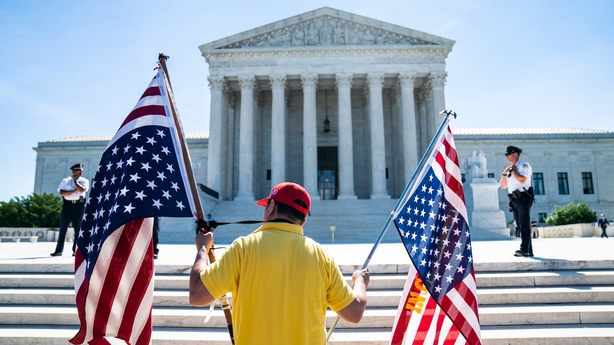The Trump administration is being sued by 17 US states and the District of Columbia, which are seeking to stop what they called its "cruel and unlawful" policy of forcibly separating immigrant families who enter the country from Mexico.
In a complaint filed with the US district court in Seattle, the states called US President Donald Trump's 20 June executive order purporting to suspend the separations "illusory."
The complaint said the administration's policy is also unconstitutional in part because it is "motivated by animus and a desire to harm" immigrants arriving from Latin America.
It comes as US Vice President Mike Pence addressed the issue of seperations at the border between the US and Mexico during the first stop of his Latin American tour
Mr Pence said that if Central Americans thinking of immigrating to the United States "can't come legally, don't come at all."
Earlier, a White House aide told reporters that Mr Pence will meet with the presidents of Guatemala and Honduras and the vice president of El Salvador on Thursday in Guatemala to discuss the immigration issue on the US southern border.
Mr Pence will be joined in the immigration talks by Department of Homeland Security Secretary Kirstjen Nielsen.
The meeting will take place a week after Mr Trump’s abrupt order to end his policy of breaking up families who crossed the US border illegally, which had prompted a global outcry.
We need your consent to load this rte-player contentWe use rte-player to manage extra content that can set cookies on your device and collect data about your activity. Please review their details and accept them to load the content.Manage Preferences
Mr Trump's executive order did not explain how his aggressive immigration policies could be adjusted to keep families intact, house them and assess their legal status, adding chaos to the immigration debate in Congress.
"To the people of Central America, I have a message for you," Mr Pence said in Brasilia. "Don't risk your lives or the lives of your children by trying to come to the United States on a road run by drug smugglers and human traffickers. If you can't come legally, don't come at all."
US Supreme Court upholds Trump travel ban
The US Supreme Court has handed President Donald Trump one of the biggest victories of his presidency, upholding his travel ban targeting several Muslim-majority countries.
The 5-4 ruling, with the court's five conservatives in the majority, ends for now a fierce fight in the courts over whether the policy represented an unlawful Muslim ban.

Mr Trump can now claim vindication after lower courts had blocked his travel ban announced in September, as well as two prior versions, in legal challenges brought by the state of Hawaii and others.
The court held that the challengers had failed to show that the ban violates either US immigration law or the US Constitution's First Amendment prohibition on the government favouring one religion over another.
Writing for the court, Chief Justice John Roberts said that the government "has set forth a sufficient national security justification" to prevail.
"We express no view on the soundness of the policy," Mr Roberts added.
The ruling affirmed broad presidential discretion over who is allowed to enter the United States.
It means that the current ban can remain in effect and that Trump could potentially add more countries. Mr Trump has said the policy is needed to protect the country against attacks by Islamic militants.
The current ban, announced in September, prohibits entry into the United States of most people from Iran, Libya, Somalia, Syria and Yemen.
The Supreme Court allowed it to go largely into effect in December while the legal challenge continued.
SUPREME COURT UPHOLDS TRUMP TRAVEL BAN. Wow!
— Donald J. Trump (@realDonaldTrump) June 26, 2018
The challengers have argued the policy was motivated by Mr Trump's enmity toward Muslims and urged courts to take into account his inflammatory comments during the 2016 presidential campaign.
Mr Trump as a candidate called for "a total and complete shutdown of Muslims entering the United States".
The travel ban was one of Mr Trump's signature hardline immigration policies that have been a central part of his presidency and "America First" approach.
Mr Trump issued his first version just a week after taking office, though it was quickly halted by the courts.

